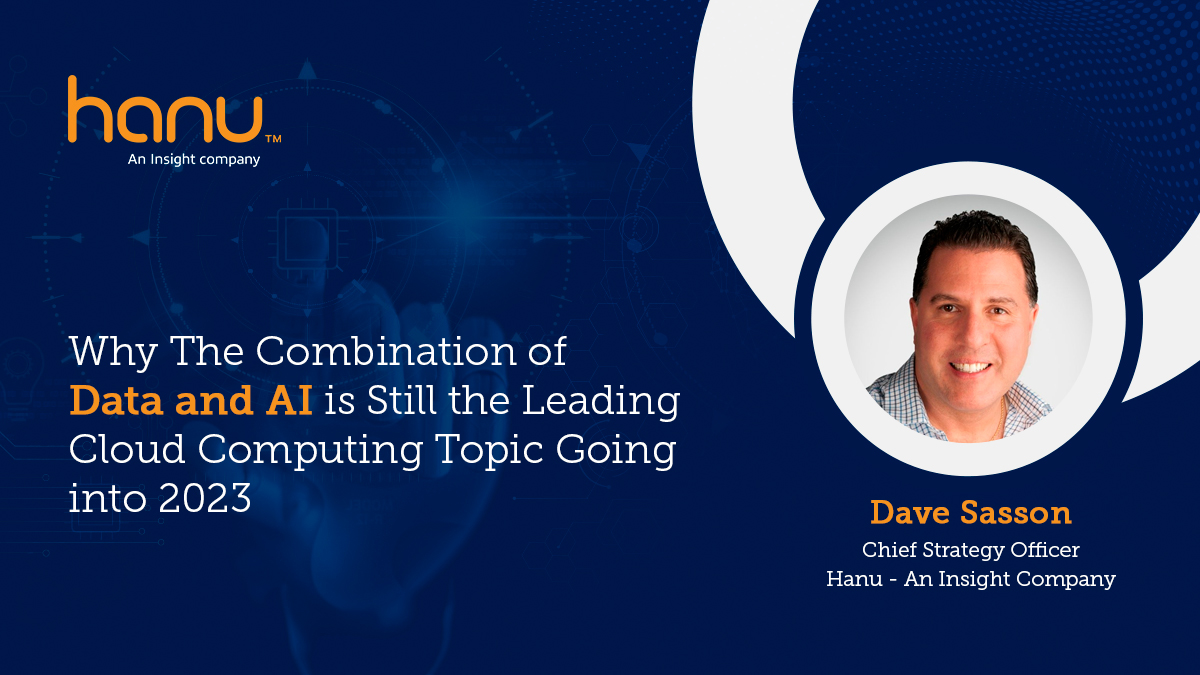
By Dave Sasson
Data has been at the heart of digital transformation for years – probably since the term “digital transformation” was coined.
But increasingly, a new IT contender is becoming synonymous with digital transformation: Artificial Intelligence (AI). AI is ushering in a new wave of techniques and tools to innovate with data – as well as several unique challenges.
As we head into 2023, here’s what you need to know about the conversation surrounding AI, data, and cloud technology.
Smart buildings are coming to combat the climate crisis
As climate change continues to be a pressing concern (and as regulations around emissions and carbon footprints tighten), AI and digital technologies are emerging to help.
One such technology is the creation and management of smart buildings. These solutions are imperative, as the construction and operation of commercial buildings account for 38% of worldwide carbon dioxide emissions.
Designed to be carbon-neutral, AI-enabled buildings will be self-managing, with automated lighting and climate control systems. AI systems will be trained using Azure Digital Twins, ensuring they achieve the desired result before deployment and maintain functionality as changes arise.
Microsoft is transforming how healthcare organizations leverage personal health data in the Cloud
New this year, Microsoft’s Health Data Services is transforming how healthcare organizations surface, view, and store data using AI in the Cloud.
By unifying structured, unstructured, and imaging data in Azure, organizations can blend population and patient data for AI development and analytics, query imaging metadata with clinical data, and use patient engagement tools for more personalized treatment and engagement.
Healthcare organizations can connect PHI data to other facets of Azure, all with the push of a button. This lets you perform everything from AI development to deep analytics, data visualization through Power BI, and operational management using Dynamics 365.
As with everything Azure, trust is at the core of their healthcare tool suite.
Health Data Services provides advanced threat detection and prevention to maintain compliance with all industry regulations, including ISO, GDPR, HITRUST CSF, and HIPAA through BAA coverage. Azure Health Data Services helps providers and payors meet the 21st Century Cures Act requirements and CMS Interoperability and Patient Access final rules.
AI-enabled machine learning supercomputers are on the horizon
For organizations looking to scale their in-house AI solutions to the Cloud, Microsoft has recently unveiled a new partnership with Nvidia. The two tech giants are building a supercomputer with tens of thousands of Nvidia GPUs, which will also be the first public Cloud to adopt Nvidia’s AI software full-stack development ecosystem.
The supercomputer will enable scalable deep learning and AI training for workloads of almost any size. Use cases include the deployment of thousands of GPUs to train language models of unprecedented sizes, build generative AI systems, and create complex recommender systems at scale.
Manufacturers are leveraging AI for predictive supply chain management
Microsoft’s new Supply Chain Platform integrates Azure AI into Dynamics 365 Supply Chain Management to bring predictive, real-time analytics to manufacturers worldwide.
Order management lets companies aggregate omnichannel inventory data and rule-based systems to automate fulfillment. This goes far beyond fulfilment – companies can use AI, customer behavior, and inventory data inventory to predict future order volumes and potential hurdles. Everything is performed in real-time, with organizations receiving up-to-the minute visibility into their order and fulfillment processes.
Dynamics 365 Supply Chain Management also comes with a module for supply and demand insights. This module uses Azure AI to predict shortages and supply constraints. Companies can use supply chain network data to run simulations and predict (and avoid) over-stocking, missed orders, and stockouts.
Self-correcting and intelligent automation for innovations
As AI evolves – particularly, AI in the Cloud – businesses will be able to delegate more and more menial tasks to machine learning algorithms. These include repetitive tasks like data analysis and the monitoring of critical-but-tedious workflows.
With time-consuming and repetitive tasks out of the way, IT teams can concentrate on innovation and strategy – tasks that drive real business value.
Cost reductions – cloud scalability goes exponential
Before widespread availability via the public Cloud, AI solutions were limited to a handful of SaaS offerings. This is due to the prohibitively high cost of building on-premises computing infrastructures capable of running modern AI systems.
AI and cybersecurity: A cautionary tale
As we’ve seen, AI opens up many new opportunities for organizations – especially when combined with public cloud solutions like Azure AI.
However, AI is not without its risks.
Due to widespread adoption, many companies have not increased their security posture to keep up with their AI solutions. This is a problem: according to a recent Gartner survey, 41% of organizations reported a security breach or privacy incident related to AI.
Companies looking to incorporate AI need to be aware of what Gartner dubs TRiSM: trust, risk and security management systems and protocols. This will require a seasoned solution provider to lead multiple business units to implement new company-wide security measures.
Want to leverage AI, data, and Azure for your growth and innovation? Contact the experts at Hanu today for a free consultation.



